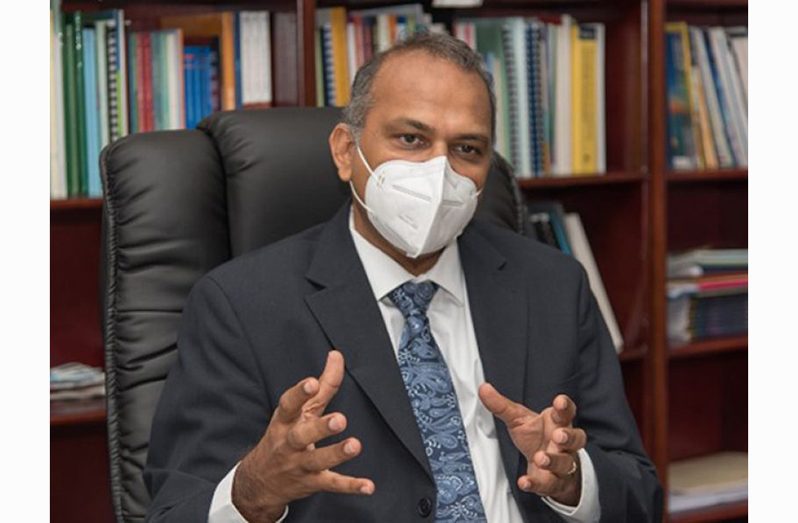— Health Minister maintains
HEALTH Minister, Dr. Frank Anthony, on Thursday, maintained that Guyana cannot detect whether there are variants of the virus, COVID-19 in Guyana, emphasising that no local laboratory has the in-house capacity to define the mutations of the virus.
During Thursday’s COVID-19 update with the Department of Public Information (DPI), the minister explained that the variant that is of much concern currently is the one that was identified in the United Kingdom (UK), called the B117. This ‘UK variant’, found to be more transmissible, was identified through genomic sequencing done in that country.
“We have not been able to detect this type of virus in Guyana because we just don’t have the capacity to do [genetic analysis],” Dr. Anthony said, adding: “For us to be able to differentiate between a variant or mutations that are happening with this virus, it must mean that our laboratories must be able to do genetic analyses and we don’t have that.”
According to the Mayo Clinic in the United States of America (USA), genomic sequencing is a process for analysing a sample of Deoxyribonucleic Acid (DNA) taken from your blood. The genomic sequencing, which is what was done in the UK according to the Guardian, analysed the virus samples taken from patients who tested positive and compared it with other cases.
And, Dr. Anthony emphasised that none of the laboratories in Guyana — whether public or private — has the in-house capability to perform this.
“People saying that we have been able to sequence the genome or look at the mutations that are occurring is just not correct,” he emphasised.
On Wednesday, during an interview with the Guyana Chronicle, Virology Laboratory Manager at Eureka Medical Laboratories, Paul Cheddie said that it would appear as though variants of the COVID-19 virus may have been in Guyana since December, 2020.
ABNORMALITIES
He made this assertion while explaining that based on the three-gene test Eureka has been conducting, it has discovered “abnormalities” when testing a number of persons who travelled abroad.
Eureka has been testing for three genes or targets associated with SARS-CoV-2 (the virus that causes COVID-19); these genes, Cheddie said, help to enable the COVID variants to bind to human cells and therefore, enter and infect the cells. He, however, highlighted that the variants can be identified because they have one less gene (that is, they have only two genes).
“When we see a positive of two genes versus a positive of three genes, that’s how we’re able to presumptively know that maybe we’re looking at something that is a variation of what we’ve previously been identifying,” Cheddi said.
This ‘missing’ gene is the S-gene, and this has been documented internationally as the gene that has indeed ‘dropped out’ in the UK variant. Cheddie, however, highlighted that Eureka does not have the capacity to further characterise the variant since it does not have the ability to perform genomic sequencing.
What this means is that while Eureka is able to identify a COVID-19 virus that is apparently different from the one being detected for months now, the laboratory is unable to state whether is the same variant from the UK or whether it is a variant from another country such as South Africa or Nigeria where other variants have been discovered.
Dr. Anthony did not comment on whether it is possible for Eureka to identify some potential variation or abnormality from the ‘normal’ COVID-19 virus that public and private facilities have been testing for locally.
TESTING WITH CARPHA
He, however, highlighted there is an arrangement between the Health Ministry and Caribbean Public Health Agency (CARPHA) whereby samples can be taken to the agency for further analysis.
“In fact, CARPHA recently started a project where they will be able to do extra surveillance on various types of this virus and they’re asking the countries that collaborate with CARPHA that if we have samples that we would like to sequence, we should contact them,” Dr. Anthony related.
He also affirmed that should the ministry determine that any sample needs that sort of genetic analysis, then, the ministry will engage CARPHA.
Though the minister did not indicate whether the abnormalities detected by Eureka warrant further analysis, he did mention that there may be some possibility of private laboratories to collect those samples and send it to a partner laboratory outside of Guyana which has the ability to perform the genetic analysis.
Cheddie noted that Eureka could possibly engage the Centre for Disease Control and Prevention (CDC) or the World Health Organisation (WHO) to conduct this further analysis if the need arises. At the moment, however, he said there are no ministry guidelines that require private facilities to do any further analysis.
On Monday, CARPHA emphasised that the Caribbean region has a “very high” risk of importing this ‘UK variant’ and indicated that four cases were already confirmed in Jamaica, as of January 4.
Amidst growing concerns of the impact this new strain will have on the Caribbean, CARPHA stated: “… countries are urged to continue maintaining national regulations inclusive of limiting gatherings, observing physical distancing measures, as well as appropriate hand hygiene and use of facial coverings where applicable. Country travel guidelines and entry requirements should continue to be enforced.”




.png)









